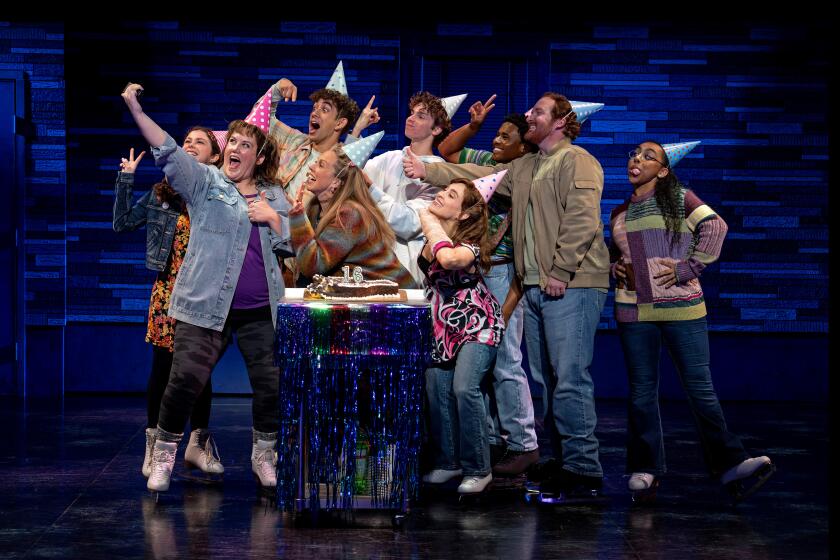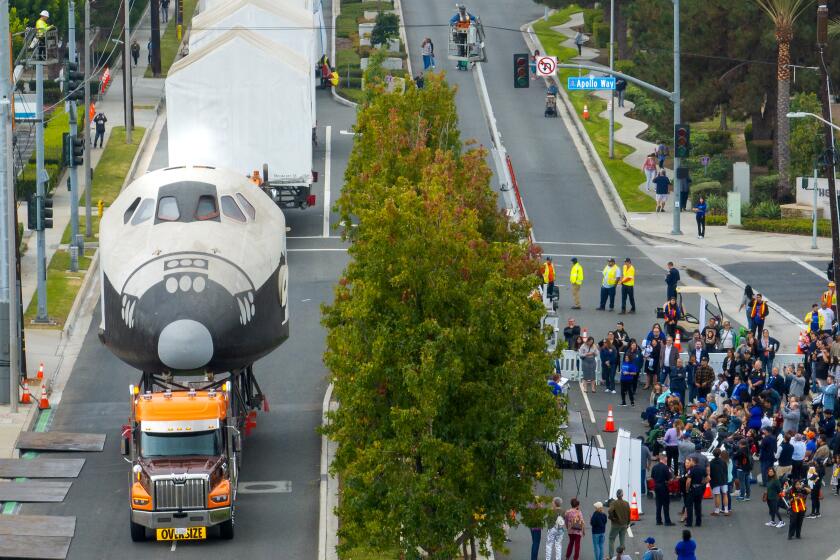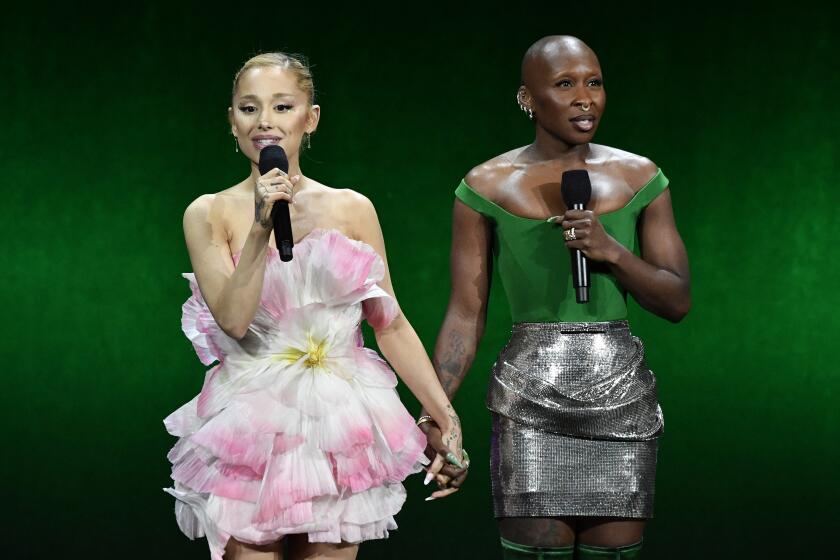‘GLORY OF EASTER’: A PASSION PLAY THAT NEEDS MORE PASSION
An Easter service in the Middle Ages: “Whom are you seeking? He is risen, He is not here,” said the priest playing the angel to the people playing Christ’s relatives, and thus was the theater in the West reborn.
“The Glory of Easter” at the Crystal Cathedral is a Southern California response to the medieval passion play. The impulse is the same: to put Christ’s crucifixion and resurrection before the faithful in a more immediate way than a sermon could, even a sermon by the church’s founder-pastor, Dr. Robert H. Schuller. (Schuller is heard on tape at the beginning, reminding us that events we are to see really happened.)
Also canonical is the show’s barrage of special effects: laser lights, angels flying around on wires, fireworks (the first time one has seen them go off inside a building), earthquake rumbles in Sensurround. This can be dismissed as sheer theatrical bombast. But the people who staged the medieval pageants were equally prone to theatrical coups, as when Christ would be winched up to heaven on a “cloud.” If Our Lord worked miracles, a show about Him was expected to do the same.
“The Glory of Easter” is within its rights to be a bit vulgar: Bible spectaculars always are. I was impressed despite myself when the Roman soldiers came down the (carpeted) walkway on real prancing horses, and I was quite blown away when the tiger came down the aisle. A tiger in church! How decadent could those Romans be?
If some of this is too much, most of it is in the right expressive key, not unlike that of grand opera, which can stir big emotions in the viewer even as he’s pooh-poohing its crudeness as spectacle. It may be old-fashioned to have the crowd cry “Give us Barabbas” in unison, but it reminds you of the power that old-fashioned theater could exert on a believing audience, which certainly defines Schuller’s congregation.
The only real cringe in “The Glory of Easter” (playing twice-a-night through April 5; call (714) 54-GLORY) comes when two pretty angels fly in to announce in song that Christ has risen.
They are accomplished fliers and good singers. They would be perfect for the cathedral’s “The Glory of Christmas” show. But they were too glibly reassuring here, almost as if, being angels, they didn’t credit the human pain of the crucifixion. Also, they were visual cliches. In the New Testament, Mary and the relatives realize only gradually that the sympathetic young man sitting on the empty tomb is a messenger from God. Somehow angels in disguise always carry more conviction.
Other than that, intelligent Christians can see “The Glory of Easter” without fear of embarrassment. It’s not high-flown or overly pious. The dialogue sticks to the New Testament (in modern English) and the narrative (read on tape by Gregory Peck) sticks to the facts, clarifying the political unrest of the time and making it easy to see why the high priests and the Romans both found Jesus such a convenient scapegoat.
There’s no trace of the vicious anti-Semitism that mars the medieval passion plays and that still hangs over the Oberammergau pageant--the idea that the Jews killed Christ as a people. The play also avoids a subtler danger. It doesn’t push the go-go optimism that some identify with Schuller. We do hear at the end that all things are possible through God, but Jesus’ ordeal is seen as real, including his despair on the cross. The dawn comes, but the darkness isn’t denied. For all its gee-whiz effects, “The Glory of Easter” is an entirely respectable presentation.
As a passion play, however, it lacks just that--passion. “The Glory of Easter” is so careful about taking the middle ground and not offending anyone that it comes off blandly, with nowhere near the vitality of those medieval plays or their modern offshoots--”Jesus Christ, Superstar,” say, or “Godspell.”
One reason is the piece’s conception of Christ, as seen in the choice of actor to play him, Miles Herter. He is a fine young performer. But his Jesus is more accessible than he is dramatic. Rather than a magnetic, mysterious leader whose garment the multitudes fight to touch, this is a blameless youth who never did anybody any harm and who can’t understand why anybody would want to hurt him now. It’s an attractive performance, but we don’t feel any particular power in this man, let alone tragedy.
Without being diffident, there’s something offhand about this Jesus, as if his only mission was to go around making people feel better--as a pop psychologist would say--about themselves. Even when he’s upsetting the money-changers’ trays in the Temple, it’s hard to see him as a force that might lead to revolution unless stopped. This Jesus is a likely lad, but no more.
“Godspell” presented Christ as even more of a naif than this, but it made clear that his clown face was a considerate ruse, a device to keep his followers from being struck blind by his divinity. At the Crystal Cathedral we don’t get the feeling that there’s anything more to this Christ than what we see. One appreciates the effort to get away from the old Man of Sorrows stereotype, but Jesus has got to be more than a youth-group leader.
Another problem with the show is its use of music. It’s extraordinary how right it seems when Mary Magdalene (Cheryl Crawford) bursts into a song of praise for Jesus, even though it’s not an especially good song. It seems to lift the script to a realm of poetry where the sets and the lights and the crowd scenes have been all along.
Theater on this scale--from the Greeks to Verdi--wants to sing. But only Mary Magdalene and the angels do so here. “The Glory of Easter” doesn’t have to be an opera, but it would profit vastly if it had a through-composed underscore, against which to set some of its great words. At the very least it would impel some of the cast to read them in less mundane fashion.
“The Glory of Easter” also is a little too impressed with its own technology. It’s a great improvement over the Chrystal Cathedral’s first “Glory of Christmas” show, where the actors mimed to a tape sound track. Here most of the words are actually being spoken by the people who appear to be speaking them, even if they do have to miked.
But the choir that bursts into a joyous Easter hymn at the end is on tape, and it’s a letdown. Compare the good vibrations of real singers in a real choir, as in “The Gospel at Colonus” at the Doolittle Theatre. For all the advances in theater technology, its prime advantage over the electronic media is the actual physical presence of the performer. “The Glory of Easter” acknowledges this by having us shake hands with the cast after the show. We shouldn’t feel divorced from them during it.
Another blandness--again, that’s the problem--is the text. The medieval passion plays have a real tang. Their authors would juxtapose the great Biblical texts against the kind of short, sharp words that carpenters and soldiers and prisoners actually use, conjoining them into a rough-cut four-beat verse.
Here, both the texts and the colloquial passage are ironed into a tidy middle-class prose, with all the color taken out. “My father’s house has many mansions,” for instance, dwindles into “My father’s house has many rooms.” The old translation may have been less exact, but it had a ring to it.
Another example: Jesus catches Judas (Barry Cutler) scolding Mary Magdalene for anointing His head with an expensive balm that could have been sold for the benefit of the poor. “Why do you bother her?” Jesus says, mildly. A medieval writer would have used a word with an edge--such as nag .
Here, too, the modern viewer remembers the tension between Christ and Judas in “Jesus Christ, Superstar,” heightened by Andrew Lloyd Weber’s throbbing score. In Crystal Cathedral the two men are polite, like office mates who have had a mild disagreement. What’s strange is that “Jesus Christ Superstar” was put together by non-believers, while “The Glory of Easter” was engineered by people who believe that the story of Christ is the most exciting ever told. Glory.
More to Read
The biggest entertainment stories
Get our big stories about Hollywood, film, television, music, arts, culture and more right in your inbox as soon as they publish.
You may occasionally receive promotional content from the Los Angeles Times.










